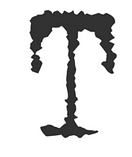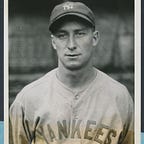Friday, June 17, 1927: New York City
The Appearance of Control
 There are a pack of writers covering the team this year, with probably a dozen of them regularly traveling with us: Paul Gallico for the Daily News; John Kieran, Richards Vidmer and James Harrison alternate for the Times; Grantland Rice and W.B. Hanna for the Herald Tribune; Fred Lieb and Dan Daniel for the Telegram, Ford Frick of the Evening Journal; Charles Segar of the Mirror; George Daley (who writes under the name “Monitor”) of the World; Frank Graham of the Sun and occasionally his buddy, Damon Runyon.
There are a pack of writers covering the team this year, with probably a dozen of them regularly traveling with us: Paul Gallico for the Daily News; John Kieran, Richards Vidmer and James Harrison alternate for the Times; Grantland Rice and W.B. Hanna for the Herald Tribune; Fred Lieb and Dan Daniel for the Telegram, Ford Frick of the Evening Journal; Charles Segar of the Mirror; George Daley (who writes under the name “Monitor”) of the World; Frank Graham of the Sun and occasionally his buddy, Damon Runyon.
I’m closest with Gallico, but I enjoy reading almost all of them — except the day after I’ve pitched badly — and I particularly like Frank Graham, who is a true gent and a big pal of Runyon and Grantland Rice.
Often Graham will just sit in the dugout before a game, listening to our conversations and then turn that into a column for the Sun — which is what he did for this morning’s paper.
 Dan Howley’s got his hands full with St. Louis. It’s only his first year managing in the bigs, but the lowly Brownies are lucky to have him. Howling Dan was my manager in the minors for three seasons, and I owe my major league career to him.
Dan Howley’s got his hands full with St. Louis. It’s only his first year managing in the bigs, but the lowly Brownies are lucky to have him. Howling Dan was my manager in the minors for three seasons, and I owe my major league career to him.
“How’s the arm feeling,” Howley asks me before the game, “long or short?”
“Long,” I reply with a smile.
Howley fixed my pitching mechanics down in the minors, when he diagnosed that I was “short-arming” the ball, throwing from the shoulder instead of fully extending and getting more push off with my legs. Now whenever we cross paths he asks me if I’m feeling long or short.
It’s impossible sometimes for a pitcher to figure out where his throwing motion has gone wrong, and depending on the problem it can be just as difficult for anyone else to figure it out, too. (After sore arms, nothing scares a pitcher more than lost mechanics.) When things are going bad, you can talk to five different coaches or players, and get 15 different opinions about what you’re doing wrong. One of the most important things I learned from Howling Dan was to pick one person you respect and ride that horse, no matter what the others say. On the Yankees, that’s Sailor Bob.
By the time I got to Howling Dan, in 1923 when he was managing the Toronto Maple Leafs in the International League, I was in my third year in the minors with a record of 11–21, and no longer a hot prospect.
(I certainly was a hot commodity, once upon a time. In my very first minor league game I threw a no-hitter for the Hartford Senators. Since then, I’ve often wondered how many professional ballplayers have had the highlight of their career happen in their first game — and if that ultimately will mean my professional career will turn out to be one slow downhill roll since July 5, 1921.)
I have a pretty good curve and a sharp forkball — but I can’t blow the ball by major league hitters, or even the top minor leaguers, and when my technique is off I struggle to find the strike zone. In ’25, Howling Dan figured out I was short-arming my pitches. That insight, and his counseling me to keep my emotions under control when things weren’t going well for me, resulted in a 28–8 season with a 2.52 ERA, my third season under him, and with the Yankees buying my contract.
I think the most important thing Howling Dan taught me was: If you feel like you need to rush, slow things down. And that applies to all of life, not just on the mound.
Despite the nickname, Howling Dan knows a lot about keeping things under control. Back in 1919, when he was a coach on the Red Sox and they were being managed by Ed Barrow (now our team’s top executive), Howling Dan was given the impossible task of trying to control a young Babe Ruth.
It’s a pretty good story…
 It’s the spring of ’19, and Barrow puts in place a strict curfew, which the Babe strictly ignores. So Barrow decides he has to put his foot down and one night when the Sox are in D.C., he personally waits up in the Hotel Raleigh lobby to catch Ruth coming in late. By 4:00 a.m. there’s still no sign of Ruth, so an exhausted Barrow heads back to his own room to get some sleep. Along the way he tells the night porter to call him as soon as Ruth finally comes in.
It’s the spring of ’19, and Barrow puts in place a strict curfew, which the Babe strictly ignores. So Barrow decides he has to put his foot down and one night when the Sox are in D.C., he personally waits up in the Hotel Raleigh lobby to catch Ruth coming in late. By 4:00 a.m. there’s still no sign of Ruth, so an exhausted Barrow heads back to his own room to get some sleep. Along the way he tells the night porter to call him as soon as Ruth finally comes in.
A little after six in the morning, Barrow’s phone rings.
Barrow puts on his bathrobe and steams down the hall to the room where he’s assigned Howling Dan to watch after a 24-year-old, out-of-control man-child. Through their transom, he sees that the lights are on and he overhears them talking. He bangs on the door and the lights go out. Total silence.
Barrow grabs the doorknob and starts to shake the door, and he quickly discovers the room is unlocked.
He enters the room and finds Ruth tucked snugly into bed, with the blanket pulled up to his chin, and no sign of Howling Dan.
“Morning, Babe.”
“Morning, Ed.”
“Where’s Howling Dan?”
“In the bathroom, I think. I’m not sure, I just woke up when you banged on the door.”
“Sorry to disturb your sleep, Babe.”
“That’s OK, Ed. Don’t worry about it. You want to get some breakfast?”
“Babe, let me ask you a question.”
“Sure, Ed,” says the Babe, yawning and wiping the sleep from his eyes.
“Do you always smoke a pipe in your sleep?”
Under his blanket Ruth is trying to hide a pipe, but the smoke is coming out of the side of his bed.
“Only when I’m having trouble sleeping,” says the Babe without missing a beat. “It relaxes me.”
With that Barrow reaches down and rips off Ruth’s bedcovers to find him “sleeping” in his street clothes — with his shoes on.
“You’re a fine citizen, Babe,” says Barrow, as he walks out the door.
In the locker room later that morning Ruth struts up to Barrow and shouts, “You come into my room like that ever again, you son of a bitch, and I’ll punch your fucking lights out.”
Barrow calmly turns to the rest of the Red Sox and says, “Gentlemen, as soon as you’re dressed, please leave the locker room and take the field for practice. Everyone except Mr. Ruth.” Then Barrow turns to the Babe and matter of factly says, “As soon as everyone clears out, I’m gonna lock the door, and I’m going to give you a chance to ‘punch my fucking lights out.’”
Now, Barrow’s over twice the Babe’s age, but he’s a big guy, and when he was young he greatly enjoyed using his fists, and he clearly has no problem using them now.
All the players and coaches get dressed and leave the locker room.
And so does Ruth, whose bark is bigger than his bite, and who wants no part of Mr. Barrow.
Barrow waits till Ruth is finished shagging flies, and then tells him he’s suspended, indefinitely.
That night on the train back to Boston, a very contrite Babe apologizes to Barrow. And he says, “What if, from now on when I get back to the hotel every night I leave you a note at the front desk, telling you the exact time I got back?”
Barrow looks Ruth in the eye and asks him, “Can I count on you to be honest?”
Ruth looks Barrow in the eye and says, “I promise you, Ed.”
Every night after that the Babe leaves Barrow a note that simply says, “Dear Eddie” and has the time of his return written on it. And Barrow does the unimaginable — he takes Ruth at his word. He never once checks with another night porter or anyone else at a hotel to confirm the time the Babe writes in his note.
Those notes from Ruth were Howling Dan’s idea.
“I realized when I was hiding in that bathroom that I was the wrong man to try and control the Babe for Barrow or anyone else. And then when I saw Ed ready to punch the Babe out — and he would have — well, I thought things might be safer for everyone if we just got Babe to punch a timecard.
“There was no way we were going to control the Babe. But we could at least have the appearance of control.”
Today, as I find myself staring at 30 years of age, I’ve come to the conclusion that, whether we know it or not, we’re all just operating under the appearance of control.
